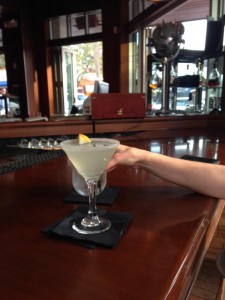 I’m over at the Contemporary Romance Cafe, examining the fraught and turbulent feelings of loving the work, but hating the artist.
I’m over at the Contemporary Romance Cafe, examining the fraught and turbulent feelings of loving the work, but hating the artist.
Tag: art
The Value of Being Flexible
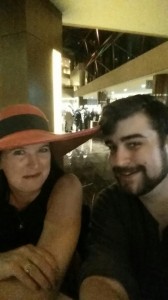 Here’s my agent, Connor Goldsmith of Fuse Literary, and I at World Fantasy Con. In the bar, of course. He tweeted this as “the beautiful people” and, as this was the very beginning of the conference, that was pretty accurate.
Here’s my agent, Connor Goldsmith of Fuse Literary, and I at World Fantasy Con. In the bar, of course. He tweeted this as “the beautiful people” and, as this was the very beginning of the conference, that was pretty accurate.
LOL
I recently ran across a post on an Indie Author loop where a writer I didn’t know, in a piece of advice on an unrelated topic, offhandedly mentioned that she changed the pen name on her books five times until she found one that sold well. That absolutely fascinated me. First, it never occurred to me to think of my author name as a sales tool. Then the fact that she had such a totally different frame of mind, a business-minded detached approach to the question, that it took me aback.
I’m very attached to my name. Arguably it’s my brand now, but even during my brief flirtation with a pseudonym, I didn’t like it not being ME.
I think this is a way that Indie authors have an advantage over authors like me. I tend to get bound up with my books being my art and an extension of myself. She seemed to have a greater level of detachment where it didn’t matter which name she published a story under, except that it be one that sold well. Finally, she also exhibited what I consider to be an enviable quality of mixing up what she’s doing and trying again.
A while back – I was going to say a couple of year ago, but it was omg 2011 – I wrote a blog post about The Guy in the Pink Suit. It’s still one of my favorite posts and something I refer to fairly frequently. It probably worth reading, but I’ll summarize so as not to max out your TLDR threshold.
The Guy in the Pink Suit trolled the sidewalk in Las Vegas for a good two hours while we ate lunch. Over and over he’d approach people, shake their hands, be charming. Sometimes they’d take pictures with him, less often they’d give him a tip. We thought he might be pimping a show because the cash intake didn’t seem to justify the effort. Regardless, I learned a great deal from him about handing rejection. Nothing dissuaded or discouraged this guy.
At least, that was my take-home message then. And it’s still an important one.
But this Indie author who changed her pen name five times to find the one that sold best made me think of him. Instead of the message being about persevering in the face of rejection, however, I realized there’s also value in mixing things up, trying a lot of different approaches until you find one that works.
A writer friend of mine recently told me about a Twitter conversation she saw between two other writers. Those two bemoaned that they were slow writers, comparing themselves to elephants with enormously long gestation periods. (We writers love our analogies.) In comparison, they described faster writers as sea turtles – who lay lots of eggs and abandon them on the beach in the hopes that few might make it to the water and survive.
Yeah, it irritated my friend, the fast writer. Understandably so. Though that’s not my point here.
The slow writers were unhappy, saying that their slow production rate might condemn them to extinction while the sea turtles presumably take over the world. Of course, the analogy breaks down immediately at this point, as anyone with a passing understanding of biology will point out that elephants and sea turtles don’t occupy the same ecological niches. There’s room for both in the world. But, more important, I think what these slow-gestation writers see as careless abandonment of huge batches of books is actually a willingness to diversify. Yes, being a faster writer lets us produce more books. (I’ve already meditated on the perception that faster means lower quality, so I won’t go into that here.) Producing books faster also lets a writer try more different things. New ideas, upside-down tropes, maybe some riskier heroes and heroines.
Those of you who paid attention in biology will recall that more variety – heterogeneity – creates stronger individuals who are more likely to find a niche they can survive in. The more specialized an organism, the narrower its ecological niche, the more vulnerable it is. Thus we lose Spotted Owls when we lose old growth timber. But the species that are flexibly, that can move into many changing niches – like the coyote – are the ones that thrive through change.
Flexibility means survival. Not a bad quality in a publishing market that sends authors and genres into extinction faster than global climate change ever could.
Finding the Formula Machine
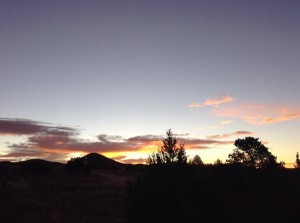 I had a Twitter conversation yesterday that went like this. Because these gals crack me up, I’m sharing a bunch of it. It, of course, started because I was being a smart ass. Though you can see that Maisey Yates was snarky first.
I had a Twitter conversation yesterday that went like this. Because these gals crack me up, I’m sharing a bunch of it. It, of course, started because I was being a smart ass. Though you can see that Maisey Yates was snarky first.
@maiseyyates oh no? sad for you. ~hides formula~ @MeganMulry
— Jeffe Kennedy (@jeffekennedy) October 16, 2014
@maiseyyates well, yes. along with the fabio poster and the monthly subscription to bon bons. where was your agent?? @MeganMulry
— Jeffe Kennedy (@jeffekennedy) October 16, 2014
Then Lexi Ryan chimed in.
@jeffekennedy@maiseyyates@MeganMulry Guy on plane asked how many bks I write a yr. Told him. He replied, “You’ve figured out the formula.”
— Lexi Ryan (@writerlexiryan) October 16, 2014
We riffed for a while, with various gripes on this theme, then dwindled off. Lexi came back a few hours later.
@MeganMulry @jeffekennedy @maiseyyates Sorry I missed so much of this convo. Was busy plugging names & occupations into the formula machine.
— Lexi Ryan (@writerlexiryan) October 16, 2014
@jeffekennedy Bc that stuff never has, like, an additional layer of significance. Pfft. Who has time for that? @MeganMulry @maiseyyates
— Lexi Ryan (@writerlexiryan) October 16, 2014
@writerlexiryan layers of significance?? I don’t worry my pretty head about THOSE things! @MeganMulry @maiseyyates
— Jeffe Kennedy (@jeffekennedy) October 16, 2014
The thing is, if you know these authors – or follow the links I thoughtfully provided 🙂 – you’ll recognize them as highly regarded, very prolific and bestselling authors. I know these gals and they work amazingly hard and produce wonderful books that, not incidentally, sell very well. And that saw about Harlequin providing its authors with the Magic Formula that Maisey references has been making the rounds for-fucking-ever. I remember my mom saying something to me along those lines when I was much younger and she thought romance were trashy literature that I shouldn’t be reading. No, Harlequin does not tell us the characters should kiss on X page and have sex on Y page. Yes, editors do give direction on story structure. However, the guideline that the first act climax should occur somewhere around the first 25% of the story and all the stakes should be set at that point applies to pretty much every entertainment genre. Maybe books in the Literary Genre don’t do that, but they’re arguably going for something other than storytelling and entertainment.
There’s a pervasive idea that writing a book takes a REALLY long time. And, in truth, writing a first novel CAN take years. Because of the learning curve. I wrote a post the other day about trying to be creative on deadline and a big piece of that is building the craft and skills to do it. However, the belief persists that quality writing should be a long, slow process. With the reverse assumption being that quickly produced work is shallow, low-quality and – yes – written to a formula. I saw a blog post by a writer the other day who championed the many virtues of writing his novels by hand, with pen and paper. He proudly stated that he could draft an entire novel this way in “only” 14 months. I also saw a tweet yesterday from a writer advising that everyone has their own process and you don’t HAVE to “churn out” 2 books a year.
While I respect both of their perspectives, I’m bothered by the implicit lack of respect for my process. It took me 84 days to write the 91,000 word first draft of The Tears of the Rose, which just received a Top Pick GOLD review from RT Magazine. I take that to mean it’s a pretty decently written book. I worked really hard on it. Yes, I structured the story about major plot points, with major events occurring at the act climaxes. Nobody gave me a formula.
It surprises me still when people call me a prolific or fast writer. It doesn’t feel that way. At the same time, taking 14 months to write out a novel long hand sounds excruciatingly slow to me. I had (or will have) five books come out in 2014 and I don’t feel like I’ve “churned out” anything. Every one has taken long hours of concentrated work, extensive crafting and pieces of my soul. I realize this is an enviable place to be and I count my blessings that I’m able to write fast.
That said, I’ve also put in a lot of effort to make sure I can. I keep my brain as uncluttered as possible. I remove all distractions, rather ruthlessly. I put in long hours. So do these other gals. They also manage to take care of small children at the same time, which I can’t even fathom.
This turned into more of a rant than I intended. I think my point is that I’d really love to see the end of this concept of the anguished author who spends years writing his magnum opus. It feels fueled to me by the sort of person who wants to be seen as someone artsy and glamorous – the Writer – rather than putting in the time to get the work done. I don’t see anything admirable about not getting the book written. We like to fetishize artists, but other kinds of work don’t get this shiny gloss on what is, ultimately, not doing the job. The grocery store checker who never quite manages to get all the groceries in the bag loses his job. The stockbrocker who just can’t overcome her personal agony to sell those stocks won’t be a stockbroker for long.
I blame the artist for this, really. We’re incredibly good at spinning convincing stories from our pain. That symphony we never delivered? IT WAS THE VOICES OF DEMONS! That studio full of blank canvases? THE BLEAK DESERT OF MY SOUL! That novel I spent ten years writing while I hung out in coffee shops and debated the shivering joy of the sound of a fountain pen on good paper? STILL NOT WRITTEN BUT LOOK HOW PROFOUND I AM.
Eh. Okay. I guess what I’m getting at is, don’t buy the song and dance, people. A creator creates. Buckle down and do the work. Don’t throw stones at people who do it faster. Don’t succumb to the temptation to glamorize what’s bogging you down. Solve the problem, take the stone out of your shoe, get to work.
Which I’m going to do now.
Happy weekend, everyone!
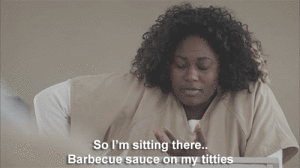
Art, Barbeque Sauce and Titties
I actually used this as analogy in a guest post for Victoria’s Gossip today, where I’m talking about my inspiration for Five Golden Rings. Seriously.
Also, Season of Seduction, the erotic holiday anthology that Five Golden Rings is in, is a Fresh Pick over at Fresh Fiction today!
In a strange, yet serendipitous coincidence, I’m also over at the Rocky Mountain Fiction Writers blog, talking about my time as a Ucross Foundation Fellow and Resident, and about writing as an art.
Hey, I’m an eclectic kind of gal…
Does Writing Faster Mean Cutting Out the Art?
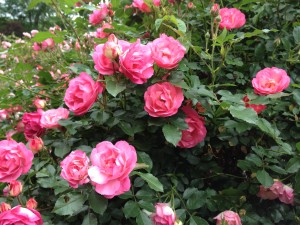 During my travels last week, I stayed with a friend of many years, Kristine Krantz (aka KAK). She blogs on the Word Whores with me and also writes fantasy. We met via the RWA online chapter FF&P, sometime back in the vicinity of 2009. We became critique partners and friends.
During my travels last week, I stayed with a friend of many years, Kristine Krantz (aka KAK). She blogs on the Word Whores with me and also writes fantasy. We met via the RWA online chapter FF&P, sometime back in the vicinity of 2009. We became critique partners and friends.
At that time, we were both in the same place – shopping these fantasy novels we’d written and hoped to sandwich into some pre-cut genre somewhere. Though my path was hardly a straight-line – no A-ticket Cinderella ride for me – mine has gone faster than hers. She’s still “pre-pubbed” or whatever euphemism you’d like to slap onto that vicious purgatory of waiting for the market to catch up to your genius. I know this is a hard place to be, because I’ve been there. Another friend and sister Word Whore, Allison Pang, who I met at the same time and in the same way, also shopping a like novel, did manage to pull the A-ticket and full Cinderella ride.
(The moral of our three paths, by the way, is that none is strewn with rose petals and nobody, so far as I know, has received a sparkle pony life companion.)
At any rate, (I’m sure by now KAK has scanned ahead to find out just what the hell I plan to say about her) KAK invited me to stay at her house while I attended the Lori Foster Reader & Author Get Together. This turned out to be an unexpected delight because we spent many hours on her delicious screened back porch, overlooking her park-like back yard, while we worked on writerly things and talked.
There’s something truly restorative about rambling conversations on writing and publishing with like-minded friend who’s as keenly interested in the minutiae as you are. Though we see each other on IM, the conversations only go so far. I also realized, as we talked, that I haven’t been updating her regularly on all of my “business.” It’s a funny thing – as you get into dealing with Published Author World, you tend to talk most to people in the same tangle. I don’t *think* I ditched my pre-pub buddy, but we’ve been working on really different things. And, as you faithful readers know, my life has been moving really fast lately.
In fact, she FINALLY (hee hee hee) completed a monstrous revision of her epic fantasy novel. “Revision” is probably a misnomer because she really wrote a whole new novel with the same world and characters. I feel quite a bit of guilty responsibility for this since I was the one to give the crit that triggered the massive rewrite.
She says she doesn’t blame me.
But it took her a long time to do this. Meanwhile I’ve been working fast. It’s nice for her to be able to do this, because she has the luxury of time right now. We know you pre-pub authors get sick of hearing this from us – we got sick of hearing it, too – but writing before contract is REALLY different than writing for contract and under deadline. We know it’s not nostalgia-worthy since being in that hem-tugging, please-see-me stage of publication wears on the soul, but having the luxury of time is something we look back on fondly. Also the lack of expectations.
KAK and I had this conversation. She mentioned that she’d noticed me blogging about writing books I sold on spec and how it feels different. I said, yes, that it feels like another kind of writing altogether. For me it means:
- I have to form a plan ahead of time, because selling on spec means I sell the concept and THEN write the book. This is not a natural pattern for me.
- Writing a story you’ve “pre-sold” to an editor creates this lens where I feel like I’m writing FOR the editor. That person is very firmly in my mind, because they are now the primary recipient of my story. I haven’t decided if this is good or bad.
- There is a firm external deadline. I have to plan ahead – by a year or more, in some cases – to ensure I have the time to write and revise the way I want to.
This last is crucial because, as I rambled on the topic, KAK nodded and said, yes, you write faster and cut out the art.
Which I’ve been mulling ever since.
Because I don’t think that’s true. I can totally see why it would seem that way. There is certainly not the time to lovingly tweak and polish every bit. There is, also, a definite sense of creating a product that fits a particular expectation (see #2 above). However, I don’t feel like I’m cutting out the art.
Maybe this is self-delusion, because I really HOPE I’m not cutting out the art.
I definitely have not managed to short-cut the suffering. Writing a book faster is no less painful than writing it slowly. It’s more that I am more efficient about it. Some of this is experience. I know by now where I’m going to bog down and how I’m going to feel about it – and I’m quite a bit more ruthless about pushing through it. I don’t have time to wander for weeks through the Enchanted Forest (see last Friday’s post, if you have no idea what I’m referring to). I’ve BEEN through that stinking forest and now I just take the direct – and sometimes arduous – path straight through to the Fountain of Story.
I think it’s less cutting out some of the art and more knowing how to pack the art in there. Like really experienced travelers can pack for a two-week trip in 30 minutes and not forget a thing. You just get good at it.
Mainly because you have to.
Speaking of which, I have a novella due on Saturday and just shy of 9K to go to finish.
See you on the flip side!
Is Your Brand Interfering with Your Writing?
 It’s funny living in Santa Fe, because it’s such a center for the visual arts. Ever since Georgia O’Keeffe arrived for a visit and fell in love with the light, visual artists of every stamp have flocked to the region. Galleries are everywhere and nearly every person you meet is a painter or a sculptor or a photographer or a jewelry maker and so on. It’s prevalent enough that it became a kind of running gag after we moved here, when we met new people – what kind of artist they’d be and how long before they told us we should buy some of their art.
It’s funny living in Santa Fe, because it’s such a center for the visual arts. Ever since Georgia O’Keeffe arrived for a visit and fell in love with the light, visual artists of every stamp have flocked to the region. Galleries are everywhere and nearly every person you meet is a painter or a sculptor or a photographer or a jewelry maker and so on. It’s prevalent enough that it became a kind of running gag after we moved here, when we met new people – what kind of artist they’d be and how long before they told us we should buy some of their art.
(I am deliberately specifying the visual arts because there’s a weird dearth of writers here. One of my writer friends calls it “the vast Siberia of literary arts” and she’s not far off.)
So, it’s not unusual to see people’s artistic efforts around the neighborhood – in a way you would never see in another community. It’s quite wonderful, really, even if some of the art is kind of bizarre. There’s one house down the block from us where the resident artist – I’m convinced it’s a woman, but I don’t know – is into painting the desert plants and artifacts. First she painted a cow skull in big blocks of lurid tempura colors – pink, green and yellow. Then a piece of driftwood. Then a wooden saguaro cactus. She seems to be into the quadrants of unnatural colors thing.
It’s not pretty.
Then I noticed the other day that she’d attacked a large, many branched cholla on their property and the poor thing is now painted in similar chunks of this bright color, which I’m pretty sure will kill its ability to photosynthesize. It’s like she’s Goldfinger, serially murdering the landscape.
At any rate, I can see what she’s going for – a very clear style – even if it doesn’t do much for me. I do wonder, however, if she’s sacrificing a heartfelt artistic effort for the sake of this style. This brand.
We writers hear about brand all the time these days. We’re in a peculiar position in that we, ourselves, are our brand. Just as we glommed onto authors, reading everything from an author on the library shelf, readers follow US, not necessarily our publishers or our genres. What we write arises out of us, but we are the physical embodiment of it because, even with print books, story remains intangible. It can be kind of a funky thing – especially when being sane about the business requires separating ourselves from our work.
I’m very careful to say “this work was rejected” or “this book got a good review,” not “I was rejected” or “I got a good review.”
But, for the purposes of branding, well meaning and helpful marketing types are forever reminding me that *I* am my brand. My brand is me. I’m pretty much just a walking, talking advertisement for All Things Jeffe. I’m picturing something like that old movie poster for the Attack of the 50 Foot Woman.
See how creepy this gets?
It struck me the other day, because I saw a youngish writer tweeting about writing tips. She said something along the lines of that, when she gets stuck writing, she thinks of her brand and what her readers would expect from her. I can see how this is smart marketing, but it bothered me. It took me a few days to pin down why.
This is the tail wagging the dog, right?
I mean, let’s look at someone like Neil Gaiman. He started out writing dark graphic novels and creepy stories. He liked wearing black t-shirts because they generally looked clean and matched everything. Over time, the way he looks and the stories he writes merged into a very recognizable “feel” that is quintessentially Neil Gaiman. This is partly because he’s a person who is comfortable with himself and his career. His sincerity and honesty, his self-deprecating humor and insightful intelligence – all of these combine to make him very recognizably himself.
But WHAT he writes is all over the place! He does exactly what the marketers advise us not to do. He writes children’s books, adult magical realism, horror, screenplays, graphic novels, science fiction and more. All under the same name, too.
Here’s how he answered a recent set of questions on his Tumblr:
1. How would you describe the genre of your work?
Stories.
2. Have you always known what genre you wanted to write, or was it a process?
I don’t know. I write stories, if that’s any help.
3. How important is the development of atmosphere and setting to the genre of your works?
Very, I think. Whatever genre they are, if they had no atmosphere or setting they would not be as good.
4. What do you prefer to write and why? (short stories, novels, screenwriting)
Yes. And the rest.
5. Is there any advice you would give to young aspiring writers? Thank you!
Write. Finish things. Worry less about genre and more about telling good stories.
Answers like this are why I admire him so much.
When he writes and hits a snag, do you think Neil asks himself what his brand is and what his readers would expect?
No no no.
Neil doesn’t think about what his brand is – or his genre, for that matter – because his allegiance is to the story. I feel very strongly that if we as writers don’t have first allegiance to the story, then we may become nothing more than factory workers, packaging little chunks of canned brand in the hopes of filling the supermarket shelves.
I don’t think we should EVER be thinking about brand while we’re writing. Writers often talk about the art of writing and the business of writing being two very different things. For me, I want to keep them that way. It’s a reality of the modern marketplace that writers must engage in the business end of writing far more than in the past. Nobody gets to be JD Salinger anymore, playing the hermit and refusing all interaction.
But we also don’t have to become what the marketers would make us into. There’s a soullessness to that and there are plenty of ways out there to make a living that are soulless and are much easier and more lucrative.
Like marketing. 😀
Seriously, if I wanted to be in sales and marketing, I would have gone to business school. I’m glad there are people who did and who then give us advice on how to get our books out there and into the hands of readers who will love them. But that’s a different way of seeing the world. I don’t tell them how supply and demand works and they don’t tell me how to craft a story.
That’s where I want my first loyalty to always be.
Story first. Sales later.
Is Suffering a Virtue?
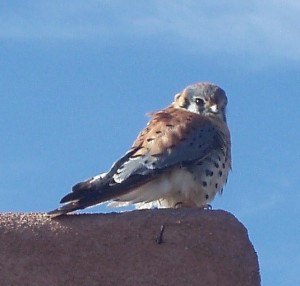 We’ve been having an interesting conversation in the comments, and in other places, on my post the other day: Careless Conclusions About Genre Reading.
We’ve been having an interesting conversation in the comments, and in other places, on my post the other day: Careless Conclusions About Genre Reading.
A number of people have mentioned that their culture’s “literary” fiction is depressing. And we’ve been tossing around the idea that literary fiction might be defined that way, as being about suffering. In some ways, this makes sense. The original essay’s author referred to it as “serious reading.” There’s a very strong idea that we gain virtue through suffering.
This concept is pervasive through many religions. In Catholicism, only the spirit matters, so the flesh should be mortified. Physical pleasure should be denied and pain sought out, to liberate the spirit from the flesh. Many oriental philosophies believe that only through pain and suffering do we grow. Pleasure puts us into a dreamy state while pain keeps us alert and aware. This kind of thinking is a part of many martial arts systems, as well. Islam is conducive to the creation of the suicide bomber because the body can be easily sacrificed for the delights of afterlife. Judaism has such a corner on suffering it’s become a stereotype.
Many religious rituals are based in creating pain – fasting, sacrifice, hours of prayer, even self-flagellation.
I think these sorts of ideas underlie the debates over “worthwhile” reading. Romance is all about love and finding happiness; therefore it’s not a weighty genre. Suffering and heartache are resolved with a happy ending, not the sacrifice of the physical self to gain enlightenment. In other kinds of genre literature, the character transformations are rarely about angst of the soul. (Although I think we could make good cases for this in many sci fi & fantasy books.)
I’ve bought into this from time to time in my life. Deliberately denied myself pleasurable things and caused myself various kinds of suffering and pain, to achieve various goals.
And you know what? I’m just not convinced.
I’m blessed with a pretty damn wonderful life. I live in a wealthy country, with access to state of the art health care, culture, food and freedom. I don’t have to worry about my village being raided by Mongols or the plagues warm weather will bring or whether the food supply will last through the winter. My concerns are minor and mostly things I choose to care about, as opposed to being life and death problems.
Which part of this am I not supposed to enjoy?
Sometimes I think just relishing all the wonderful things in life is enlightenment right there. Love, sex, music, food, the scent of flowers and the colors of the migrating birds, time spent talking to interesting people, practicing my art – all of it is so full, rich and rewarding.
It might not be a serious attitude, but then, I never claimed to be a saint.
Never really wanted to be one, in fact.
On that note, I hope you all have a fabulous and FUN weekend!
Why Writing Is Like a Forest Fire
 One thing about forest fires – they make for dramatic sunsets.
One thing about forest fires – they make for dramatic sunsets.
A lot of people here are bemoaning the fire. For those not up on Western news, the Wallow Fire is now the third largest in Arizona’s recorded history. The fire covers 486 square miles, has been burning for over a week and firefighters have zero containment. Fortunately they’ve been able to keep it away from the towns so far and let it burn away at the dry forested hillsides.
But people have been saying things like “why do there have to be forest fires?” And I hear them blaming oil companies for global warming.
They really don’t like it when you point out that forest fires are part of nature and play an essential role in the cycle of the forests and fertilization of the soil. Nature isn’t always a pretty, happy place with serene lakes and chirping birds. Sometimes it’s ugly and violent. Plants and animals are consumed and remade. Flames and smoke boil through and overcome everything.
We’ve had to seal up the house, to keep the smoke out. The other night it was so thick, it was like night fell hours early. I worried about the birds, with their tiny lungs.
But in the morning, the hummingbirds were out as usual, feeding in the clear morning air.
David pointed out something to me the other day. He says I said it to him, but I don’t remember it. We’d watched Creation, a really excellent movie about Darwin, with Paul Bettany (yum!) and Jennifer Connelly. In the movie he struggles with Parkinson’s disease, the death of his daughter and a spiritual crisis that threatens his til-then strong marriage. Writing his manuscript is a huge effort.
David used that as an example and said that, when we have an art or a pursuit we’re passionate about, it nurtures us. It’s wrong-headed to think we live our lives to nurture it. Rather, it’s when people lose their passions that they falter and waste away.
I don’t live to support my writing. My writing is what keeps me alive.
It’s all part of nature.

